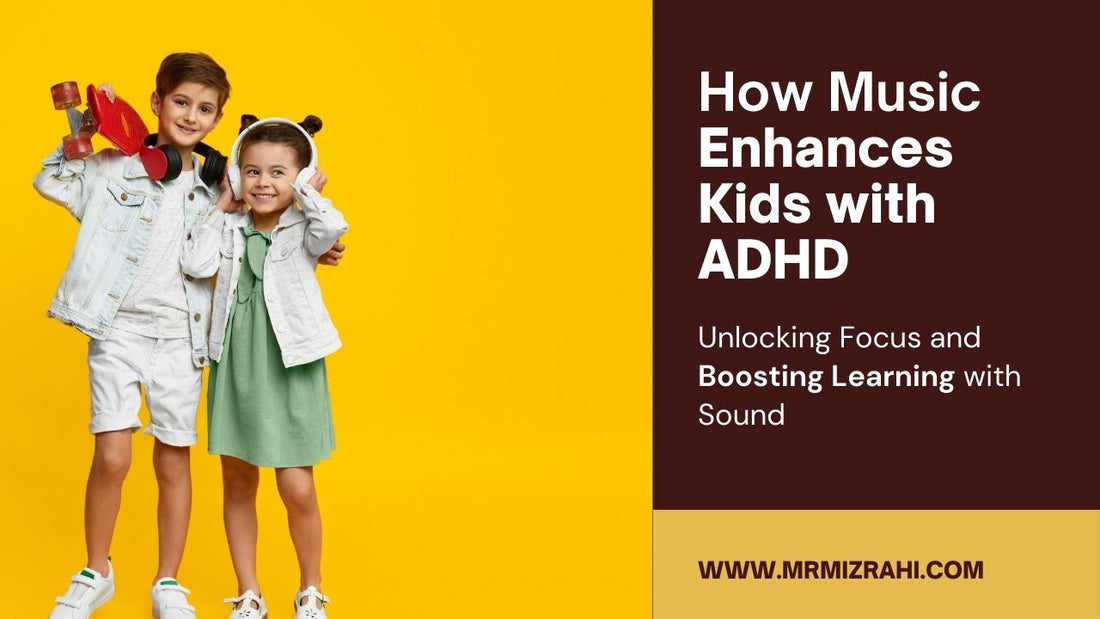
How Music Can Help Improve Attention and Learning
Share
Music has an incredible ability to influence our mood, heart rate, and even cognitive function. But did you know that it can also be a powerful tool for improving focus, especially for children with ADHD?
How Music Supports Brain Development
Research has shown that music strengthens key areas of the brain that are often weaker in children with ADHD. These include the auditory, visual/spatial, and motor cortices, which are essential for skills like speech, reading comprehension, math, problem-solving, and overall brain organization.
While medication and counseling are common approaches to managing ADHD, music therapy is an effective, non-invasive method that can help children structure their thoughts, improve self-regulation, and enhance focus.
Not All Music Works the Same Way
When it comes to boosting focus, not all music is created equal. Studies have found that classical music is particularly beneficial. In fact, research by Dr. Donald Shetler of the Eastman School of Music found that children who listened to classical music for just 20 minutes a day showed improvements in memory, speech and language skills, and brain organization.
One well-known phenomenon, the "Mozart Effect," suggests that listening to Mozart’s compositions may enhance mental performance. While the scientific debate continues, many educators and parents swear by classical music’s ability to create a calm and focused learning environment.
The Right Music for Studying
For some people, studying in silence can be counterproductive, leading to boredom or even drowsiness. The right background music can help maintain engagement and reduce distractions. However, music with lyrics can be more disruptive than helpful, as the brain processes words in a way that can interfere with comprehension and focus. Instead, instrumental music, particularly classical or ambient sounds, is best for studying and working.
How Music Stimulates the Brain
Neurologist Dr. Oliver Sacks famously stated, "Nothing activates the brain so extensively as music." Science backs up this claim—listening to music can increase dopamine levels in the brain. Dopamine plays a crucial role in motivation, working memory, and attention, all of which are often lower in individuals with ADHD.
By boosting dopamine levels, music can help children develop better self-control and concentration, both at home and in the classroom.
Music as a Tool for Organization
Many children with ADHD struggle with structuring their thoughts and activities. Because music has a clear structure—rhythm, melody, and progression—it can help children develop a sense of order. Music therapist Kirsten Hutchison notes that structured music helps children plan, anticipate, and react appropriately to various situations.
Additionally, music can aid in following directions. Many children with ADHD find it difficult to process and retain multi-step instructions, but the rhythmic and repetitive nature of music can improve their ability to follow cues and stay on task.
Music’s Soothing Effect
Music has a profound impact on emotions, which makes it a valuable tool for reducing impulsivity and restlessness. Slow, tranquil music can help children regulate their emotions, making it easier to focus on tasks and reducing anxiety levels.
Music as a Social Activity
Beyond individual benefits, music is also a social experience. Participating in music—whether through playing an instrument, singing, or even moving to the rhythm—helps children develop social skills. Music therapy is often used to teach children with ADHD how to listen attentively, take turns, and respond to social cues.
Music therapy can take many forms, from listening and performing to composing and writing lyrics. These activities provide an outlet for children to express their emotions while also reducing anxiety and hyperactivity.
Try It for Yourself!
If you’re interested in using music to help improve focus, I’ve created a curated playlist of music proven to enhance concentration and attention. Give it a try and see how it works for you or your child!
Coach Benjamin Mizrahi. Educator. Learning Specialist. Family Coach. Father. Husband.
More articles on EXECUTIVE FUNCTIONS COACHING – Benjamin Mizrahi
